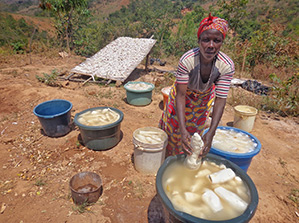
Ales remembers collecting cassava from the stagnant pools of muddy water. For Ales Nyasulu, who lives in the Chikwina-Mpamba Area Program in Malawi, cassava is a primary source of food for her family. “We depend on cassava as our staple food in this community. The process of coming up with cassava flour demands that we soak the cassava in water for some days before it is dried up and ready for pounding,” she says. “Since we had no source of potable water, we had to depend on swamps or dirty pools of water along the valleys,” says Ales.
Cassava is a starchy tuberous root, that when ground into flour, is used to make a hard porridge called nsi-ma. The porridge is eaten with beans, vegetables or other types of relish.
This tedious method of preparation was a way of life for Ales and other women in the community. After peeling the roots, women would carry their heavy cassava harvest down into the valley to soak in the contaminated and stagnant waters. This practice was a serious health hazard, but they had no other option. Ales’s children were negatively affected by the lack of potable water and struggled with bouts of diarrhea.
The situation changed for Ales and others in the village with the arrival of World Vision’s Water, Sanitation and Hygiene (WASH) Project. World Vision established a gravity fed, piped water system in the area and built a water tap near Ales’s home. Because of this project, the community has easy access to potable water for improved health. The piped water system project has been a double blessing for Ales and other women in the community. In addition to having easy access to safe drinking water and improved health, the project has also simplified the cassava flour processing exercise for them. Instead of spending a lot of time carrying heavy loads of cassava down into the valleys and the stagnant pools of water, Ales now soaks her cassava in pails of clean water within her household compound.
Ales and her neighbors have experienced a huge transformation of their lives. During the time they were using stagnant pools of water, there were many cases of diarrhea in the village, but they did not associate it with soaking the cassava in stagnant waters. “We are now enjoying better lives together with our families,” she says. There is an improvement of health in the community as diarrhea is no longer prevalent in the area. Ales’s children have access to clean water and are enjoying good health. “The water project has been a big relief to us. We are now healthier than before...we also have reduced the time of cassava processing since we no longer have to walk to the valleys,” says Ales. She remains grateful to World Vision for improving the health of the community and easing the cassava processing work.







